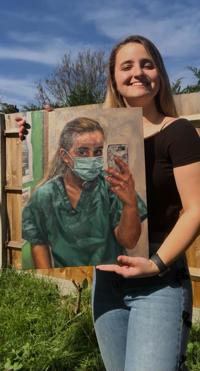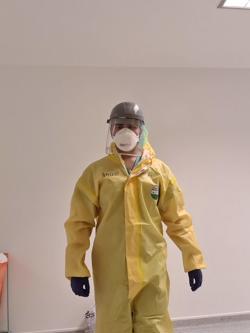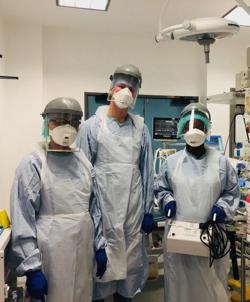The pandemic 2 years on: Students on the frontline
Published: 23 March 2022
Today marks two years since lockdown was introduced in England, marking the day the Covid-19 pandemic would change our lives for the foreseeable future.
Here at St George’s, many of us were forced to work and study from home, with virtual meetings and lessons becoming part of the new normal. Meanwhile, at the start of the pandemic, the only research taking place on campus was that related to researching coronaviruses, with the aim of helping the world find its way out of the biggest global health crisis in a generation.
For the majority of us, finding ways to cope with the uncertainty became essential, in order to protect our physical and mental health, those around us and the NHS. During this time, there were also those who coped by doing. Staff and students across the St George’s community stepped up to work and volunteer in multitudes of ways to make people’s lives better while the world around them shut down.
We caught up with three of our students who responded by taking on additional work alongside their studies by supporting NHS colleagues in the most difficult of circumstances. We found out about their motivations, the challenges they faced and what life looks like for them now.
Theodora Cantea, Biomedical Sciences

“A few months before the pandemic, I had just started my first degree of Biomedical Science and had an incredible first five months of university life when the pandemic began.
“Just like a lot of other university students, especially being a fresher, I got really involved in university life and my weekly timetable ended up being incredibly busy. When I found that suddenly everything was put on hold, it felt quite empty at first. It wasn’t too long until the novelty of the daily walk and constantly baking banana bread wore off and I desired to get more involved to give me that bigger sense of purpose.
“I saw the opportunity to step out onto the Covid wards as a healthcare assistant and I expressed my interest within the first two weeks of the pandemic.
“I remember working multiple night shifts in a row for the first few weeks, which my parents initially found quite hard to digest. I then started to volunteer with an initiative set up by a medical student at St George’s, called Covid Response, which was set up to distribute essential food and self-care items throughout the hospital.
“There was definitely a lot I did not expect to see or have to handle just a few weeks after turning 19, but I think the past two years have also been where I have grown the most, both as an individual contributing to society and as a future healthcare professional. I can’t describe what it’s like holding a young girl’s hand who is telling me how frightened she is and how alone she feels, only to return a few nights later to find out she died a few hours after I had left.
“I think I learnt how to manage my own feelings and reflections a lot better, which is such an important life skill. Knowing how to process things in a constructive, meaningful way that is also not of detriment to aspects of your life.
“I still work as a healthcare assistant, mostly doing night shifts on the intensive care units at St George’s. With each shift, I still feel I am continuing to learn so much yet have gained so much confidence in myself and in my approach to patients when assisting throughout the shift.
“Having got my medicine offer just before starting my final year of Biomedical Science in 2021, I am excited to continue developing myself into the healthcare professional that I hope to be one day. I’ve met countless wonderful and inspirational people within the healthcare setting and hope I can bring the best of myself for wherever I find myself in the near future and beyond.”
Ameer Afridi, Medicine

“I was just in my first year at St George’s when everything got shut down and everyone went home. There were lots of opportunities for students to help out. But most weren’t very clinical, and I was hoping to find something more relevant to my course. I was thinking, if I’m a medical student, hopefully there are ways clinically I can help out. It wasn’t until the university emailed saying people could step forward to work on the Covid Intensive Care Units, that I had something I knew was right for me.
“I started working as a healthcare assistant (HCA). The beauty of it was that you don’t need any qualifications, so it was something I felt I could do. When I started on the wards, it was very busy, especially during the first wave. There was lots of running to get equipment and medication. Once I was settled, and the teams knew my face, then they started to let me see the patients, clean them, take observations and care for them.
“I put myself forward for the opportunity as I wanted to help out and this was the best way I could do that. I’m also quite extroverted and didn’t like the idea of having to stay at home. So I thought, what better way to do something with your day than helping on the frontline.
“I’ve learnt so much about the NHS, patient care during this time. The staff are so hardworking. Whether it’s doctors, HCAs or nurses, everyone performs their job with such elegance.
“I’ve also learnt a lot about myself. In our lectures, they talk about being aware of burnout. I didn’t really understand until last year when I was working a lot. 12-hour shifts are extremely intense, and you don’t get a lot of rest.
“Working as an HCA has helped me to become more confident with patients, which will help me in my medical career. I have no problems talking to patients now because I’ve had so much experience talking to them, dealing with them, and checking in on them. It just feels normal.
“As well as working on the wards, I’ve also spent time in the vaccine clinic, which I’ve loved. It’s very different to what I had been working on, because on the wards, the environment is much more intense and the patients that come in are in a worse state. But the vaccination ward was the complete opposite – they were hopeful, coming in to get a vaccine so they can leave their house or go outside. It was really nice dealing with every age group in the clinic.
“The experience that I’ve gained from the last two years has been invaluable. It’s so important for the rest of my life working as a doctor, to have the knowledge and insight into how nurses and HCAs work in the hospital, to empathise with them and to work closely with them. I’ve learnt so much and am looking forward to seeing where my career takes me.”
Jakub Saniukiewicz, Biomedical Sciences

“Before the pandemic I was a full-time, first-year biomedical sciences student. It has been my dream for years to purse a degree in medicine – my plan was to study it at postgraduate level following my current degree.
“As soon as I heard that there was an appeal for St George’s students to assist with the first surge of Covid-19 patients, I immediately raised my interest. Not only was this a perfect opportunity to help so many nurses and doctors in need of extra hands, looking back at it now, it was the beginning of my career as a medic.
“I entered the makeshift Covid Intensive Care Unit with no experience. Two years later, I am so much more confident in the clinical setting that I have spent hundreds of hours alongside doctors and nurses in intensive care, supporting and working with patients from all walks of life. I have been reflecting on all my experiences in a journal that I hope to one day publish as a book titled, “So, you want to be a doctor?”
“I fell in love with critical care medicine and hope to pursue this further when I qualify. My dream of becoming an anaesthetist has been jump-started by these experiences. Without them, I potentially would not currently be on the clinical transfer pathway and graduating as a doctor in the next three years!
“Working in a fast-paced environment has taught me that I enjoy working under pressure and I have developed my skills further by obtaining a certificate in first-response level 3. I continue to develop my knowledge and skills as a shift leader for a first-responder team at a large theme park alongside my studies.”
You can find out more about our response to the Covid-19 pandemic on our Proud to Care webpage.